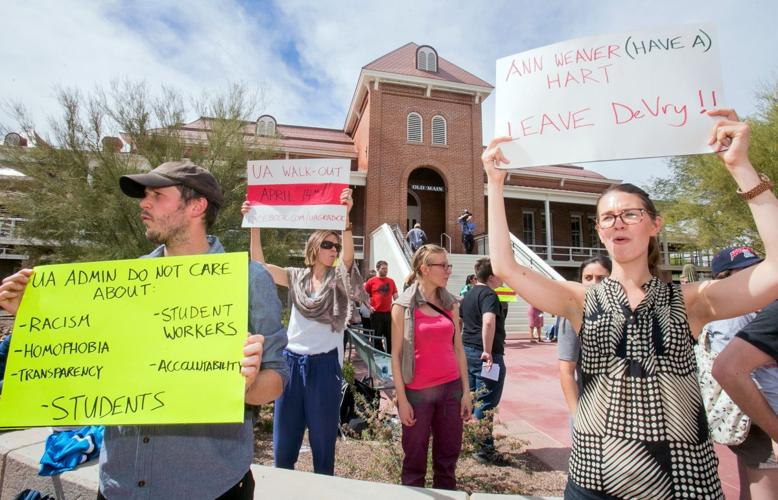Public complaints have been piling up against University of Arizona President Ann Weaver Hart’s decision to join the board of a troubled for-profit college firm, but the president isn’t backing down.
Despite criticism from students, academics and alumni, Hart says she still believes her side job with DeVry Education Group is a good idea. Also, the head of the Arizona Board of Regents voiced her support for Hart’s decision.
“I agreed to serve on the DeVry Group board in order to be a voice for quality and for positive student outcomes,” said Hart, who will make $70,000 a year plus $100,000 in stock from DeVry on top of her $665,000 pay package from the UA.
Hart said she plans to “work toward assuring that higher education is available to a segment of Americans who will never be able to attend universities like the University of Arizona.”
Jim Finkelstein, a George Mason University professor who has researched corporate board service by university presidents for nearly 20 years, says Hart is the only public university president in the country serving on the board of a publicly traded, for-profit college firm.
Her decision to do so has raised eyebrows in higher education circles, Finkelstein said, because “people consider it to be really on the very outside edge of what’s appropriate for a public university president.”
Another public educator who signed on with DeVry the same day Hart did, University of California-Davis Chancellor Linda Katehi, quit the board within days after a public outcry.
Illinois-based DeVry Group, parent firm of DeVry University, is being sued by the Federal Trade Commission for allegedly deceiving students, allegations the firm denies. Hart and Katehi joined the board a few weeks after the FTC filed suit in January.
Seventeen people, including alumni, employees and parents of UA students, have submitted written complaints about Hart’s DeVry job to the university, the Arizona Board of Regents or both.
Hart also faced questions at a Faculty Senate meeting Monday. A half-dozen senators who questioned her were about evenly split between supporters and opponents of the president’s decision, said Lynn Nadel, chair of the faculty.
As well, about 50 UA students and employees marched outside Old Main on Friday shouting anti-Hart slogans such as “DeVry can take her! We don’t want her!”
Hart was not on campus at the time. She was in Las Vegas attending the Pac-12 Conference basketball tournament, UA spokesman Chris Sigurdson said.
Many who object to Hart’s board position said she has hurt the UA’s reputation by working with a firm accused of misleading students about their career prospects.
“I believe her association with this pseudo-university tarnishes the image of the University of Arizona,” wrote Merrie Brucks, a marketing professor at the UA’s Eller College of Management.
Critics said Hart receives a generous salary to lead the UA and shouldn’t divide her loyalties.
“She is well-paid to be president of the U of A. It’s not a part-time job and requires her full attention,” wrote alumnus Robert Kahl.
Some asked the regents to adopt restrictions that would require the state’s university presidents to get permission for outside work.
Under current policy, Hart didn’t need anyone’s OK to serve on the DeVry board. The policy requires only that she let regents know about it, which she did. The policy also says campus presidents must make their jobs running the universities their primary focus.
Eileen Klein, president of the Board of Regents, said she supports Hart’s decision.
“I do not question Dr. Hart’s commitment to the University of Arizona. It is strong and the university’s brand or status hardly will be undone by her decision,” Klein wrote in an email.
She said Hart can help DeVry become a stronger organization. “In this rapidly changing landscape of higher education delivery, done right, both institutions can learn from one another as a result of her appointment,” she said.
Klein said while there’s nothing wrong with Hart’s decision, the board may review its rules for outside board work by university presidents in response to public concerns.
Hart said DeVry does not compete with the UA for students because DeVry’s main target market is older students who dropped out, flunked out or never had the chance to go to college.
She said she vetted DeVry thoroughly before joining the board and is confident the company is on solid ground.
The FTC says DeVry “deceived consumers about the likelihood that students would find jobs in their fields of study, and would earn more than those graduating with bachelor’s degrees from other colleges or universities.”
For example, the federal agency said DeVry falsely claimed that 90 percent of its graduates who actively sought work landed jobs in their fields within six months.
The figure is bogus, the FTC said, because DeVry included graduates who were working in unskilled jobs such food service, car sales, or delivery driving as well as those who were still in the same jobs they had before they started school.
DeVry denies wrongdoing and has pledged to fight the federal enforcement action.
A. Lee Fritschler, a former assistant secretary of higher education for the U.S. Department of Education during the Clinton administration, said its not unusual for retired university presidents to join the boards of for-profit college operators.
But he agrees with Finkelstein that its virtually unheard of for the sitting president of a flagship public university to do so.
“A university president serving on another university’s board is highly irregular,” Fritschler said.
“Would the president of General Motors serve on the board of Ford or Toyota?”







